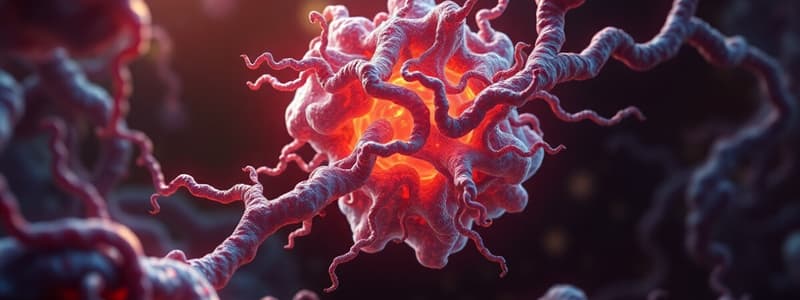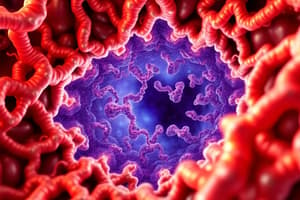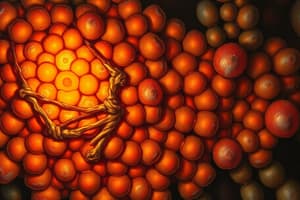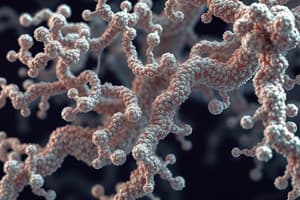Podcast
Questions and Answers
What is the primary function of lysosomes within a cell?
What is the primary function of lysosomes within a cell?
- Storage of genetic material
- Synthesis of lipids
- Digestion of extracellular proteins and turnover of organelles (correct)
- Production of ribosomal RNA
Which type of endoplasmic reticulum is involved in protein synthesis?
Which type of endoplasmic reticulum is involved in protein synthesis?
- Vacuolar ER
- Membrane-bound ER
- Smooth ER
- Rough ER (correct)
What triggers the activation of autophagy in cells?
What triggers the activation of autophagy in cells?
- Nutrient starvation (correct)
- Cellular division
- Nutrient abundance
- Increased oxygen levels
In the label-chasing experiment, where were de novo synthesized proteins first localized?
In the label-chasing experiment, where were de novo synthesized proteins first localized?
What percentage of all cell membranes is constituted by the endoplasmic reticulum's membrane?
What percentage of all cell membranes is constituted by the endoplasmic reticulum's membrane?
What is the role of the smooth endoplasmic reticulum?
What is the role of the smooth endoplasmic reticulum?
What happens to proteins synthesized in the Rough ER after they are processed?
What happens to proteins synthesized in the Rough ER after they are processed?
What is the primary purpose of proteolysis in protein maturation?
What is the primary purpose of proteolysis in protein maturation?
What is the function of autophagosomes?
What is the function of autophagosomes?
What type of glycoprotein involves the carbohydrate being attached to the nitrogen atom of asparagine?
What type of glycoprotein involves the carbohydrate being attached to the nitrogen atom of asparagine?
What role does glycosylation play in the endoplasmic reticulum (ER)?
What role does glycosylation play in the endoplasmic reticulum (ER)?
What is a common regulatory mechanism that affects enzyme activity?
What is a common regulatory mechanism that affects enzyme activity?
Which modification involves the binding of small molecules that can change enzyme conformation?
Which modification involves the binding of small molecules that can change enzyme conformation?
How do lipid molecules typically interact with polypeptide chains?
How do lipid molecules typically interact with polypeptide chains?
What happens during the formation of functional proteins from larger inactive precursors?
What happens during the formation of functional proteins from larger inactive precursors?
What is the effect of retroinhibition in metabolic pathways?
What is the effect of retroinhibition in metabolic pathways?
What is the primary function of the Golgi trans network?
What is the primary function of the Golgi trans network?
Which type of glycosylation occurs in the Golgi apparatus?
Which type of glycosylation occurs in the Golgi apparatus?
What role does the enzyme Oligosaccharyl-transferase play in glycoprotein processing?
What role does the enzyme Oligosaccharyl-transferase play in glycoprotein processing?
How many enzymes does the Golgi apparatus contain for glycoprotein modification?
How many enzymes does the Golgi apparatus contain for glycoprotein modification?
Where does the modification of N-glycosaccharides occur primarily?
Where does the modification of N-glycosaccharides occur primarily?
Which of the following best describes the internal environment of lysosomes?
Which of the following best describes the internal environment of lysosomes?
What happens to glucose residues during protein processing in the ER?
What happens to glucose residues during protein processing in the ER?
Why can proteins leave the Golgi with different oligosaccharides attached?
Why can proteins leave the Golgi with different oligosaccharides attached?
What type of enzymes do lysosomes primarily contain for degradation processes?
What type of enzymes do lysosomes primarily contain for degradation processes?
How do lysosomes contribute to the digestion of materials captured from outside the cell?
How do lysosomes contribute to the digestion of materials captured from outside the cell?
Which of the following best describes the pathway of proteins through the Golgi?
Which of the following best describes the pathway of proteins through the Golgi?
What could be a consequence of mutations in the genes coding for lysosomal enzymes?
What could be a consequence of mutations in the genes coding for lysosomal enzymes?
What is actively transported into lysosomes to maintain their acidic pH?
What is actively transported into lysosomes to maintain their acidic pH?
How are lysosomes morphologically characterized?
How are lysosomes morphologically characterized?
What role do lysosomes play in the context of cellular materials that are obsolete?
What role do lysosomes play in the context of cellular materials that are obsolete?
What component is recognized at the 5′ end of eukaryotic mRNAs to initiate translation?
What component is recognized at the 5′ end of eukaryotic mRNAs to initiate translation?
Which factor is responsible for binding the initiator methionyl tRNA in eukaryotic translation initiation?
Which factor is responsible for binding the initiator methionyl tRNA in eukaryotic translation initiation?
What is the first step in the initiation of translation in bacteria?
What is the first step in the initiation of translation in bacteria?
What happens to IF1 and IF3 during bacterial translation initiation?
What happens to IF1 and IF3 during bacterial translation initiation?
Which of the following eukaryotic initiation factors binds to the mRNA cap structure?
Which of the following eukaryotic initiation factors binds to the mRNA cap structure?
What primarily determines the three-dimensional conformation of a protein?
What primarily determines the three-dimensional conformation of a protein?
During the formation of a pre-initiation complex in eukaryotes, which substances are associated?
During the formation of a pre-initiation complex in eukaryotes, which substances are associated?
Which type of chaperone is directly involved in preventing misfolding during the synthesis of a polypeptide?
Which type of chaperone is directly involved in preventing misfolding during the synthesis of a polypeptide?
What is the primary role of eIF-4G in eukaryotic translation initiation?
What is the primary role of eIF-4G in eukaryotic translation initiation?
What initiates the hydrolysis of GTP bound to IF2 in bacterial translation initiation?
What initiates the hydrolysis of GTP bound to IF2 in bacterial translation initiation?
What is the function of mitochondrial chaperones during protein transport?
What is the function of mitochondrial chaperones during protein transport?
How do chaperonins assist in protein folding?
How do chaperonins assist in protein folding?
Which enzyme is crucial for catalyzing the formation of disulfide bonds during protein folding?
Which enzyme is crucial for catalyzing the formation of disulfide bonds during protein folding?
What might result from defects in protein folding?
What might result from defects in protein folding?
What role do cytosolic chaperones play during the transport of partially folded polypeptides?
What role do cytosolic chaperones play during the transport of partially folded polypeptides?
What is one of the diseases associated with protein folding defects?
What is one of the diseases associated with protein folding defects?
Flashcards
Translation
Translation
The process by which ribosomes synthesize proteins from mRNA.
Polycistronic mRNA
Polycistronic mRNA
A type of mRNA that contains multiple coding sequences, each of which can be translated into a separate protein.
Initiation Codon
Initiation Codon
The start codon, AUG, which signals the beginning of protein synthesis.
Initiator tRNA
Initiator tRNA
Signup and view all the flashcards
Initiation Complex
Initiation Complex
Signup and view all the flashcards
Initiation Factors (IFs)
Initiation Factors (IFs)
Signup and view all the flashcards
7-methylguanosine cap
7-methylguanosine cap
Signup and view all the flashcards
Ribosome Scanning
Ribosome Scanning
Signup and view all the flashcards
Chaperones
Chaperones
Signup and view all the flashcards
Nascent polypeptide chain chaperones
Nascent polypeptide chain chaperones
Signup and view all the flashcards
Transport chaperones
Transport chaperones
Signup and view all the flashcards
Assembly chaperones
Assembly chaperones
Signup and view all the flashcards
Amino-terminal chaperones
Amino-terminal chaperones
Signup and view all the flashcards
Chaperonins
Chaperonins
Signup and view all the flashcards
Protein disulfide isomerase (PDI)
Protein disulfide isomerase (PDI)
Signup and view all the flashcards
Protein folding diseases
Protein folding diseases
Signup and view all the flashcards
What are lysosomes?
What are lysosomes?
Signup and view all the flashcards
What is endocytosis?
What is endocytosis?
Signup and view all the flashcards
What is autophagy?
What is autophagy?
Signup and view all the flashcards
When is autophagy activated?
When is autophagy activated?
Signup and view all the flashcards
What is the endoplasmic reticulum (ER)?
What is the endoplasmic reticulum (ER)?
Signup and view all the flashcards
What is the rough ER (RER)?
What is the rough ER (RER)?
Signup and view all the flashcards
What is the smooth ER (SER)?
What is the smooth ER (SER)?
Signup and view all the flashcards
How do proteins move through the ER?
How do proteins move through the ER?
Signup and view all the flashcards
Methionine Removal
Methionine Removal
Signup and view all the flashcards
Amino Terminus Modifications
Amino Terminus Modifications
Signup and view all the flashcards
Signal Sequence Removal
Signal Sequence Removal
Signup and view all the flashcards
Precursor Cleavage
Precursor Cleavage
Signup and view all the flashcards
Glycosylation
Glycosylation
Signup and view all the flashcards
N-linked glycoproteins
N-linked glycoproteins
Signup and view all the flashcards
O-linked glycoproteins
O-linked glycoproteins
Signup and view all the flashcards
Lipid Binding
Lipid Binding
Signup and view all the flashcards
What is the role of the Golgi apparatus in protein processing?
What is the role of the Golgi apparatus in protein processing?
Signup and view all the flashcards
What enzymes are involved in protein glycosylation in the Golgi apparatus?
What enzymes are involved in protein glycosylation in the Golgi apparatus?
Signup and view all the flashcards
What is N-linked glycosylation?
What is N-linked glycosylation?
Signup and view all the flashcards
Why are N-linked glycosaccharides modified in the Golgi?
Why are N-linked glycosaccharides modified in the Golgi?
Signup and view all the flashcards
How are N-linked glycosaccharides modified in the different compartments of the Golgi?
How are N-linked glycosaccharides modified in the different compartments of the Golgi?
Signup and view all the flashcards
What factors determine the final glycosylation pattern of a protein?
What factors determine the final glycosylation pattern of a protein?
Signup and view all the flashcards
What is the role of the Golgi apparatus in protein distribution?
What is the role of the Golgi apparatus in protein distribution?
Signup and view all the flashcards
Why do proteins leave the Golgi with different oligosaccharides?
Why do proteins leave the Golgi with different oligosaccharides?
Signup and view all the flashcards
Lysosomes
Lysosomes
Signup and view all the flashcards
Hydrolases
Hydrolases
Signup and view all the flashcards
Lysosomal storage diseases
Lysosomal storage diseases
Signup and view all the flashcards
Endocytosis
Endocytosis
Signup and view all the flashcards
Rab proteins
Rab proteins
Signup and view all the flashcards
Intracellular transport
Intracellular transport
Signup and view all the flashcards
Acidic pH
Acidic pH
Signup and view all the flashcards
Acidic pH maintenance
Acidic pH maintenance
Signup and view all the flashcards
Study Notes
Unit 5: Protein Distribution and Transport
- Protein synthesis is the final stage of gene expression
- Protein synthesis involves translation of mRNA, folding, and processing.
- Gene expression is regulated at the translational level
- Different mechanisms modify protein quantity and activity (e.g., degradation)
Index 5.1 Protein synthesis, processing and regulation:
- mRNA translation
- Protein folding and processing
- Regulation of protein function
- Protein degradation
Index 5.2 Endoplasmic reticulum:
- Membrane-bound network of tubules and sacs
- Continuous membrane
- Roughly 50% of all cell membranes
- Rough ER is associated with ribosomes, involved in protein synthesis and processing.
- Smooth ER does not associate with ribosomes, involved in lipid metabolism
Index 5.3 Golgi apparatus:
- Proteins synthesized and processed in the ER are reprocessed and distributed (e.g., lysosomes, plasma membrane, secretion)
- Glycolipids and sphingomyelin are synthesized in the Golgi
- Complex processing and distribution
- Multi-compartment structure functions in protein modifications
- Involved in secretion, sorting, modifications
Index 5.4 Vesicle transport mechanism:
- Fundamental cellular activity
- Responsible for traffic between membrane-bound compartments
- Key for functional organization of the cell
- Vesicle transport involves selective packaging and recognition of target membrane
- Mechanisms controlling vesicle packing, budding, distribution, and fusion are areas of extensive research
Index 5.5 Lysosomes
- Membrane-bound organelles containing enzymes to degrade biological polymers
- Lysosomes are a crucial part of the cell's digestive system
- They degrade material taken up from outside the cell and digest cellular waste
- Dense spherical vacuoles of varying sizes and shapes
Protein Folding and Processing
- Polypeptides fold into 3D conformations
- Many proteins aggregate into functional complexes
- Post-translational modifications include cleavage, covalent union of carbohydrates and lipids
- Necessary for correct cellular function and localization
- Chaperones facilitate folding of other proteins or assembly processes of protein complexes
- Essential in preventing misfolding and aggregation
- Examples of essential chaperones include Hsp70, chaperonins.
Diseases due to protein folding defects
- Protein aggregation results in a variety of diseases, such as Alzheimer's, Parkinson's and others
- Characterized by accumulation of misfolded proteins
Regulation of protein function via small molecules
- Most enzymes are regulated by modifications in their conformation
- Often mediated by non-covalent binding to small molecules
- Allosteric regulation involves a change in conformation and enzyme activity outside of the active site
- Retroinhibition of metabolic pathways
- Regulation of translation factors (e.g., eEF-1a) through GTP and GDP binding
Phosphorylation and other protein modifications
- Phosphorylation is the most common covalent modification, regulating protein activity
- Protein kinases transfer phosphate groups from ATP to side chains of serine, threonine, or tyrosine
- Protein phosphorylation is reversed by phosphatases that catalyze hydrolysis of phosphorylated amino acids
Other modifications by covalent bonding (e.g.)
- Acetylation
- Methylation
- Nitrosylation
- Glycosylation
Glycosylation
- Addition of carbohydrate chains to proteins to form glycoproteins
- More frequent in eukaryotic cells
- Proteins folding, intracellular targeting, and recognition in intercellular interactions. Examples: N-linked and O-linked glycoproteins.
Protein-protein interactions
- Many proteins are multi-unit, involving interactions between subunits that regulate activity
- For example, cAMP-dependent kinases
Protein Degradation
- The quantity of proteins in the cell is regulated by their rate of synthesis and degradation
- The half-life of proteins varies, ranging from a few minutes to several days.
- Pathways involve ubiquitin-proteasome (degradation of proteins targeted by tags like ubiquitin) and lysosomal proteolysis.
Quality control in the ER
- Misfolded proteins are removed from the ER through ER-associated degradation (ERAD).
- Chaperones and protein-processing enzymes act as sensors detecting misfolding
Export (secretory pathway)
- Proteins and lipids are exported from the endoplasmic reticulum (ER) via vesicles
- Different types of transport vesicles are used to transport the materials to the Golgi
The Golgi Apparatus
- Primarily involved in the processing and distribution of proteins and other molecules
- The Golgi's structure divides into distinct regions including cis, medial, and trans, with further modification at the trans-Golgi network
- N-glycosylation is a key modification
Labeling of proteins to target the ER
- Proteins can be directed to the ER via co- and post-translational translocation
- A signal sequence is a key element in the directing process
- The signal sequence contains between 15-40 amino acids, often including basic amino acids and a hydrophobic segment, leading to proper targeting for the ER
Translocation of proteins into the ER membrane
- Multiple mechanisms handle the translocation of proteins into ER membrane
Lipid Binding and Lipid Synthesis
- Lipids are hydrophobic molecules
- Synthesized in the smooth endoplasmic reticulum (SER)
- Phospholipids are important membrane components, derived from glycerol
- The SER is involved in the synthesis of other membrane lipids (cholesterol and ceramide)
Synthesis of phospholipids
- Fatty acids are transferred to glycerol-3-phosphate (creating phosphatidic acid).
- Phospholipids are synthesized on the cytoplasmic side of the ER
Translocation of phospholipids across the ER membrane
- Enzymes facilitate translocation through the membrane
- Phospholipid flippases cause uniform growth of two halves of the phospholipid bilayer
Insertion of proteins into the ER membrane
- Integral membrane proteins are embedded in the membrane by hydrophobic regions that cross the lipid membrane.
- Proteins that cross the membrane often have a series of amino-acid regions with alpha-helices
- The orientation of protein insertion is important, with some proteins having the amino or carboxyl end exposed on one side (e.g., cytosolic side).
The Ubiquitin-Proteasome Pathway and Lysosomal Proteins
- Proteins destined for lysosomes are recognized and processed differently during their passage through the Golgi
- Modification of these proteins involve phosphorylation of mannose residues to distinguish them from the secretory pathway
- Ubiquitin-proteasome system, and lysosomal acid hydrolases help maintain the correct pH
Endocytosis and Lysosome Formation
- One main function of lysosomes is the degradation of material captured by cell externalization through endocytosis
- Endosomes are the result of vesicles fusing with membrane material.
Phagocytosis and Autophagy
- Lysosomes digest material via these pathways
- Phagocytosis, specialized cells ingest and degrade large particles
- Autophagy is a cell's own components replacement function
Gaucher's Disease
- Lysosomal storage disease due to a deficiency in glucocerebrosidase enzymes
- Accumulation of undigested materials in lysosomes, leading to cellular dysfunction and health issues.
- Several clinical types with varying severities
Studying That Suits You
Use AI to generate personalized quizzes and flashcards to suit your learning preferences.
Related Documents
Description
Explore the critical concepts surrounding protein synthesis, processing, and regulation in biological systems. This quiz covers mRNA translation, the role of the endoplasmic reticulum, and the functions of the Golgi apparatus. Test your understanding of how these cellular components work together to ensure proper protein distribution and activity.




